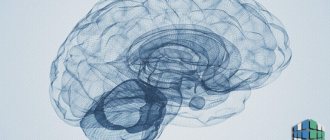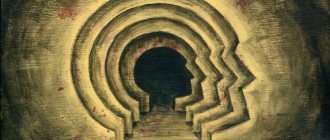Depth psychology is based on the idea of the independence of the psyche from consciousness, the desire to substantiate the existence of a psyche independent of consciousness and to study it in isolation from it. The concept of “depth psychology” combines several movements, the central position among which is occupied by S. Freud’s psychoanalysis. Within the framework of this movement, the concepts of analytical psychology by K. Jung and individual psychology by A. Adler are also distinguished.
Definition 1
The main difference between depth psychology and empirical psychology is the understanding of the psyche as a phenomenon separate from consciousness; consciousness is understood as a property inherent in the psyche at certain moments.
The focus of depth psychology is on personality problems, since it is the unconscious, in the understanding of representatives of this approach, that plays a decisive role in the process of formation, identification and research of a person’s system of oneiric values.
Are you an expert in this subject area? We invite you to become the author of the Directory Working Conditions
Concept and essence
Depth psychology combines several areas of psychological science that have a similar basis. Each of them suggests that human behavior is influenced to a greater extent by hidden motives that hide behind the surface of consciousness.
This science is based on the theories of many famous scientists:
- Psychoanalysis of S. Freud. He argued that the main driving force of any unconscious processes, feelings, and experiences is sexual energy.
- Individual psychology of A. Adler. She calls the driving force behind unconscious processes the sense of power. Describes it using the example of the relationship of a small child to the adults around him.
- Analytical psychology of C. G. Jung. His theories are similar to Freud's, but he calls life energy the driving force.
- Logotherapy by Viktor Frankl In his opinion, mental development occurs when a person learns the meaning of life.
Independent areas of depth psychology:
- Clear separation of consciousness and psyche. Their independent position relative to each other.
- The basis of all human mental life is the unconscious deep layers.
- The formation of personality depends on the unconscious, since it is fundamental to behavior.
- The main task of science is to prove the influence of the unconscious on the behavior of an individual.
- The psychic phenomenon is consciousness, but it is not considered influential because it is subordinate to the unconscious.
Considering the knowledge of the unknown, we can highlight several main theses:
- When the balance between cultural principles and instincts is disturbed, disorders of a neurotic nature arise.
- Any desires that arise at the level of instincts are contrary to social provisions.
- People's behavior depends on processes generated outside of consciousness. Depth psychology recognizes the autonomy of the individual and combines unique methods for its study.
The structure of mental life in psychoanalysis
S. Freud's focus is on the structure of mental life, in which the levels of conscious, preconscious and unconscious are distinguished, with censorship between these levels.
Definition 2
Consciousness has the property of experiencing, awareness.
Definition 3
The preconscious is an immanent, latent unconscious that can penetrate consciousness, that is, it acts as potentially conscious.
Definition 4
The unconscious is understood as a repressed unconscious psyche, which does not penetrate into the creature, and accordingly does not have the property of experiencing, but finds its representation in dreams, major and minor psychopathological symptoms, respectively, the cure of patients suffering from neuroses requires the study of precisely the unconscious material.
Formation and development
The beginning of the development of depth psychology can be indicated by the publication of Sigmund Freud’s book “The Interpretation of Dreams.” This event dates back to 1900. In his further works, he argued that consciousness is a thin film that hides the enormous contents of the unconscious. Because of this, any scientist who does not try to study what is hidden will receive a minimal amount of information about the individual.
Many psychologists continue to try to decipher dreams. They are sure that these are encrypted messages from the unconscious. After Freud, Jung developed depth psychology. He made a great contribution to the development of analytical areas of psychological science.
Adler laid down the postulates of individual psychology. He said that any child after birth feels inferior. The baby is trying to compensate for what is missing. Gradually, unconscious life principles appear, which often lead to the appearance of mental disorders.
Stages of psychosexual theory
- Oral stage (from 0 to one and a half years). It got its name due to the fact that the mouth is considered the main sensory organ of a child during a given period of time. Directly with its help, he not only saturates his body, but also gets to know the world around him, feels a lot of pleasant feelings for him. This stage is the period of formation of sexuality. The result of fixation is the acquisition of a feeling of pleasure during smoking, sarcasm. In addition, there is oral hostility, a feeling of dependence on others.
- Anal stage (from 1.5 to 3 years). During this period, the baby’s parents begin potty training the baby. Freud believed that the child gains enormous pleasure from actions associated with defecation, namely because he is able to control such a serious procedure without the help of others. The child experiences sexual pleasure from the ability to control muscles. Fixation in this case can be of two types:
- in the first case - a tendency to destruction, suppression of impulses, frugality, stinginess;
- in the second - disagreement, rage, hostility, rebellion.
- Phallic stage (from 3 to 6 years). Detection of the presence or absence of the penis. The erogenous area is the genitals. The emergence of emotions against the background of conflict - Epidov (Electra) complex. In addition, when a female child discovers the absence of a penis, it leads to a feeling of envy of boys, a desire to have a penis arises (the attraction of girls to their father is based precisely on this), shifting the blame onto the mother due to the lack of a penis. This stage is considered more fundamental for the development of mental disorders.
- Latent stage (from 6 to 12 years). Sexuality is not expressed in any way. Views aimed at social activity and standards of life are formed.
- Genital stage (puberty). Understanding gender. The goal of the teenager is to find an object for sexual communication and genital sexual satisfaction. Individual desires are subject to sexual desire (libido).
Followers of the direction and their discoveries
There are several outstanding followers of depth psychology who have made great discoveries for its further development. The founders of the theory of psychoanalysis and depth psychology were:
- Z. Freud. He argued that after a person is born, he initially has unconscious instincts towards death and life. Gradually it can transform into an attraction to suicide.
- A. Adler. Every person has an unconscious feeling of inferiority, a strong desire for superiority, which allows him to compensate for what is lacking. An individual meaning of life is gradually formed, which is built on a form of compensation.
- K. Jung. Personal behavior is influenced by the psychic energy of libido, which distributes human experience with the help of innate archetypes. At the same time, he distinguished two levels of the unconscious - individual, social.
- K. Horney. The scientist argued that people have a feeling of fundamental anxiety, which may have a psychological, physiological basis. Conformism (attraction to people), a feeling of withdrawal from society, and aggression towards others are constantly manifested.
- E. Fromm. Every individual has an innate desire for independence, rootedness, and individualization. In this case, the typology is based on one of two needs - to have or to be.
- G. Sullivan. He emphasized the presence of a constant feeling of anxiety.
- E. Erickson. Throughout life, a person never stops occupying. A person goes through 8 stages of his own development.
Other scientists have made less significant contributions to the knowledge of the unconscious.
Basic ideas of depth psychology
- the unconscious plays a dominant role in human behavior and inner life;
- defense mechanisms of the psyche establish a balance between instincts and cultural norms;
- neurotic disorders, contradictory behavior, inadequacy are a consequence of an imbalance between the drives of the unconscious and cultural-normative prescriptions;
- balance of mental and social development is achieved through a balance between cultural norms and instincts;
- the psyche is independent of consciousness;
- study of the unconscious in isolation from consciousness.
About the methods of depth psychology
Methods and theories
To get to the unconscious, modern psychiatrists use two techniques:
- Study of dreams. During sleep, the brain sends signals to a person about his hidden problems. The state of sleep allows the body to relax, which helps thoughts come without difficulty. They come in an incomprehensible form that needs to be deciphered. In fact, there is a separate branch of psychology that studies dreams and explains the signs that people see while in their dreams.
- Free association technique. Initially, the patient should make himself more comfortable in front of the psychologist and tell him everything that he has accumulated on an exciting topic. The conversation should start with small things, slowly approaching important points. Gradually, the patient will involuntarily talk about the reasons for the occurrence of negative situations and internal conflicts. After the story, the psychologist explains to the person what he told, clarifies controversial and interesting points.
The point of these techniques is to deal with a person’s internal problems, to help him cope with his experiences.
Depth psychology combines many areas of psychological science that study the unconscious, hidden beyond the boundaries of consciousness. Over time, effective techniques have emerged that help psychologists improve the psychological state of people.
Jungian views
- The unconscious contains repressed experiences and other personal level problems at its "upper" and "transpersonal" levels ( eg
collective, not-self, archetypal) forces at its core. The semiconscious contains or is the conscious pattern of personality, including everything on the spectrum from individual vanity to workplace personality.[4]
- Archetypes are the original elements of the Collective Unconscious in the psychology of Carl Gustav Jung. Archetypes form an unchanging context from which the content of cyclical and sequential changes derives its meaning. Duration is the secret of action.[5]
- The psyche spontaneously gives rise to mythical-religious symbolism or themes and is therefore spiritual or metaphysical as well as instinctive in nature. The implication is that the choice of whether to be a spiritual person can be made regardless of whether or how we apply it, including to non-spiritual aspirations.
- All minds, all lives, are ultimately included in a kind of myth-making in the form of themes or patterns. Thus, mythology is not a series of old explanations of natural phenomena, but rather the richness and wonder of humanity played out in a symbolic, thematic, and systematic narrative.
Chapter 1.
Theoretical aspects of Depth Psychology.
1.1.History of the emergence of depth psychology.
The foundations of psychoanalysis were developed by the Austrian psychiatrist and psychologist Sigmund Freud. Representatives of psychoanalysis, unlike behaviorists and Gesttelt psychologists, did not focus on the exact and natural sciences as a model for constructing scientific psychological knowledge. They sought to find a way out of the crisis in psychology itself, forming a closer union with other sciences that also deal with mental phenomena, for example, medicine.
Freudism - and this is its merit - sought to fill psychological knowledge about a person with new life truth, create a theory and, on its basis, obtain information useful for solving practical, primarily psychotherapeutic problems. It is no coincidence that Freud began his scientific research precisely with the analysis and generalization of psychotherapeutic practice and only then turned the accumulated experience into a psychological theory.
Psychology in psychoanalysis has again found a living person, since ancient times its inherent depth of penetration into the essence of his soul and behavior. however, carried away by his speculative theoretical constructions (most of them, as it turned out later, did not have a statistically reliable factual basis), Freud moved further and further from empirical reality into the realm of psychological fantasy, and this led to the rejection of many of his ideas not only from a number of sensible scientists, but also from Freud’s own students.
The further fate of psychoanalytic teaching and attitudes towards it in different countries developed differently. At first, everyone except Freud's closest students and followers treated him very coolly. then it attracted supporters in Germany and Austria, in Europe, in the United States, where it is still quite popular.
In the first years of Soviet power, domestic psychologists were also interested in it, seeing in this teaching one of the possible materialist alternatives to the then dominant introspective idealistic psychology. then, in the 30s, along with the limitations of psychological research, the beginning of strong incompetent ideological pressure on this science, which especially intensified after the release of the resolution of the Central Committee of the All-Russian Communist Party (Bolsheviks) “on pedological perversions in the system of People's Commissariat of Education” (1936), everything was subjected to sharp criticism Freud's teaching.
1.2.Comparative analysis of depth psychology and behaviorism.
Despite the differences and opposition to each other of classical psychoanalysis and behaviorism, these directions have much in common in the consideration of personality, that is, a person acts as a spiritless being, since none of these directions are interested in the full sense of the values and meanings of human existence. In addition, in these directions, a person’s dependence on the past is postulated. Thus, psychoanalysts exaggerate the dependence of a person’s existence and the formation of his personality on the experience of early childhood and relationships with parents, and behaviorists exaggerate the role of incorrectly developed behavioral skills in personality development.
Representatives of these directions are also united by the idea that personality is destructive in its essence and imperfect because it depends on the past. Behaviorists attribute to a person the role of a “passive victim of bad learning,” and psychoanalysts present a person as a victim of a conflict between social norms and biological instincts. Therefore, in both directions, the personality is destructive, unadapted, dependent, out of date, sick, and therefore it must be treated according to a given psychoanalytic or behavioral scheme. in both cases, the psychologist finds himself in a “above” position, and the person being studied becomes an object, a thing or a victim of circumstances, fate, other people who, knowing better than the person himself, what he needs for happiness, treat and develop him. This is the directiveness and manipulative nature of these directions.
Recommendations
- Henri Ellenberger, The Discovery of the Unconscious
(1970) p. 562 - Sigmund Freud, On Metapsychology
(PFL 11) pp. 175-6 - Chalquist, Craig. “What is depth psychology?” terrapsych.com
. Re-engaging the Soul of Place (Spring Journal Books, 2007). Archived from the original on 2012-12-24. Retrieved 2013-02-19. - Adams, Lee. "Doctor". Jung's Predilection for Eastern Spiritual Practices
. Retrieved May 3, 2022. - Dr. Fredricks, Randy. "Depth Psychology". Theoretical Approaches: Depth Psychology
. Randy Fredricks. Archived from the original on 2013-04-12. Retrieved 2013-02-19. - M. Hardt / K. Weeks eds., Reader Jameson
(2000) p. 198 - Eileen Barker, Of Gods and Men
(1983) pp. 173-5 - Brown, R. (2014). Developing relationships. International Journal of Jungian Studies
, 6.3, 243-253.
Regular classes5
| Tuesday 20:00–21:30. Or Thursday 18:00–19:30. | Group of personal growth and self-knowledge “Meeting”. Weekly evening group online Apply now 1.5 hours Moscow | Studio of modern psychoanalysis |
| Lada Viktorovna Goleneva |
| Every day, any time by appointment | In person and online Regular classes “Making amulets, mandalas, amulets, talismans” Discount 100RUR individually Moscow | Olga Nikolaevna Zavodilina |
| Wednesday from 19:00 to 22:00 | Body support club “My body is my resource” Apply now 3 hours Moscow | Body support club “My body is my resource” |
| Monday from 20:00 to 21:30, or Thursday from 12:00 to 13:30 | Group supervision in person or online. Supervision group for psychologists “Contexts” Find out details 1.5 hours - 1 lesson Moscow | Lada Viktorovna Goleneva |









